Human Waste Pollutes State Drinking Water
Problem often caused by septic systems; Tougher laws needed, experts say.
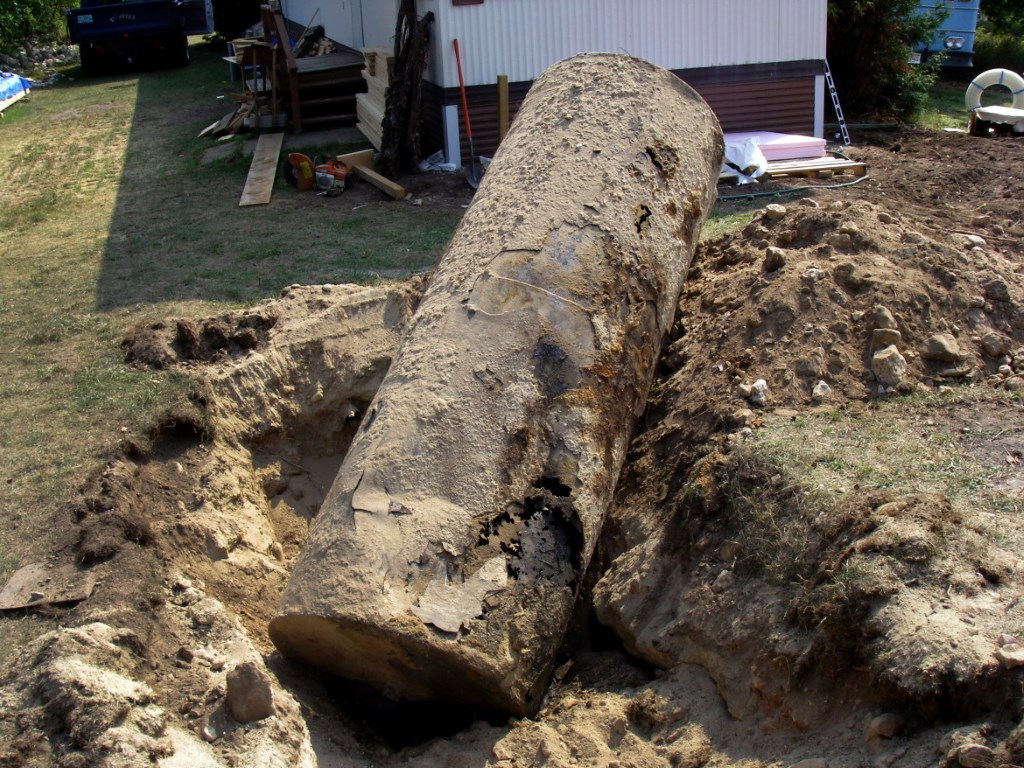
A steel septic tank is removed from a Door County residence in 2007. Over 20 years ago, steel septic tanks were an inexpensive option for homeowners, but now up to 90 percent are breaking down and require replacement. Door County Assistant Sanitarian Chris Olson says homeowners who installed more expensive fiberglass tanks have fewer problems over time. Photo courtesy of the Door County Sanitarian’s Department.
Manure has been blamed for much of the bacteria and viruses that pollute Wisconsin drinking water, but contamination from human waste is a problem, too.
Failing septic systems, leaking public sewer pipes and landspreading of septic waste can introduce dangerous pathogens into both rural and urban water systems.
In June 2007, 229 people were sickened by a norovirus in Door County while eating at a restaurant. Seven were hospitalized as a result of a pathogen known for spreading illness on cruise ships. The source: a leaky septic system.
In 2012, a microbiologist published research that linked widespread gastrointestinal illnesses in 14 Wisconsin communities to viruses in the public water systems. Further research showed the contaminants were likely coming from leaking municipal sewage lines.
That same year, the Wisconsin State Journal reported that top Department of Natural Resources officials went easy on a political supporter of Republicans, including Lt. Gov. Rebecca Kleefisch, after the donor was caught violating septic waste spreading rules on fields near 40 drinking water wells, potentially exposing residents to nitrate, which can cause “blue baby syndrome,” and illness-causing pathogens.
In 1993, Wisconsin experienced the most deadly waterborne disease outbreak in U.S. history. One hundred people died and 403,000 became sick in Milwaukee when cryptosporidium contaminated the city’s drinking water. Lab tests confirmed the parasite had come from human waste.
Some experts say the state’s septic regulations and well standards are not adequate to protect public health in areas of Wisconsin with fractured bedrock, such as Door County.
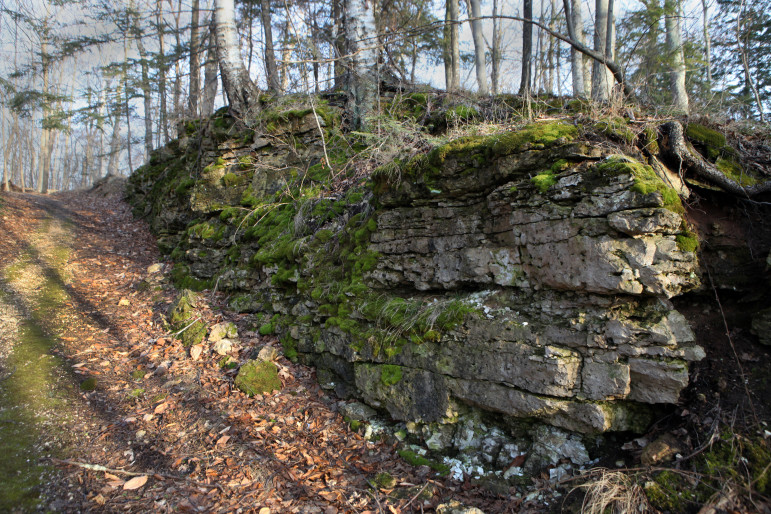
The fractured karst geography of Door County is seen in this exposed piece of bedrock along a driveway in Ephraim. The porous bedrock found in the county makes it easy for sewage that leaks from failing septic tanks to make its way into private drinking water wells. Photo by Coburn Dukehart of the Wisconsin Center for Investigative Journalism.
In addition, municipal water systems in Wisconsin are not required to test for or treat water to kill viruses because the Legislature in 2011 rescinded a rule that would have mandated such action. And a study by a retired hydrogeologist has found that the state sometimes fails to enforce regulations that ban spreading untreated septic waste on fields vulnerable to groundwater pollution.
Septic systems are the main line of defense in rural areas against water contamination from human waste. The potentially lethal waterborne disease outbreak at a new restaurant in Door County in June 2007 illustrates the weakness of existing regulation, especially in areas with fractured bedrock.
In a 2011 paper in the journal Ground Water, a team of Wisconsin scientists investigated the outbreak, which began with four employees who got acute gastroenteritis. The virus that caused the sickness also was detected in the restaurant’s new water well and septic system.
Researchers concluded that the cracked bedrock under the restaurant, which is common in eastern Wisconsin, allowed waste from the broken septic system to move rapidly into the restaurant’s drinking water well.
The scientists noted that Door County and other areas that sit atop such karst geology have long dealt with the vulnerability of their fractured limestone aquifers to such contamination. They cited a Nov. 22, 1955, headline from the Door County Advocate newspaper warning that local geology had been tied to cases of “summer flu.”
Most residents, the researchers wrote, assume that waste from septic systems is biodegraded by soil on the way down to the groundwater and then safely diluted. But that is not always true.
Experts: Stricter rules needed
The researchers recommended that the state should reconsider allowing conventional septic systems to be built above fractured limestone aquifers, especially those serving facilities such as restaurants that generate a lot of wastewater.
John Teichtler, Door County’s sanitarian, said recent surveys show that about one-third of 6,450 septic systems inspected in his county were classified as failing to work. Teichtler said systems are considered to be failing when they do not meet current standards requiring 3 feet of soil to bedrock, are discharging to the surface or allowing waste to back up into buildings.
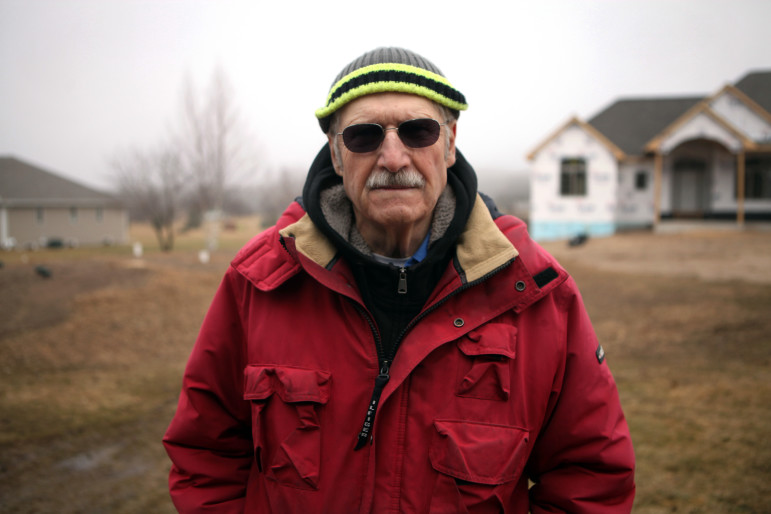
John Teichtler, Door County sanitarian, is seen near a property his office inspected during the construction of its septic mound system. The Door County Sanitarian Department was created in the mid-1960s by the county board because of concerns that failing private sewage disposal systems were contaminating drinking water. Teichtler has worked for the department since 1971. Photo by Coburn Dukehart of the Wisconsin Center for Investigative Journalism.
Sampling results in Door County, according to the University of Wisconsin-Extension, show that at any one time in the county, at least one-third of the private wells contain bacteria from animal or human waste.
Ken Bradbury, director of the Wisconsin Geological and Natural History Survey and one of the authors of the Ground Water paper, said he believes the state’s septic laws must be updated to account for the susceptibility of areas such as Door County.
“There is still the perception that just because there is a septic system that meets code, everything is fine,” Bradbury said. “Well, everything is not fine.”
In its 2015 report to the Legislature, the Wisconsin Groundwater Coordinating Council, a multi-agency panel that advises state government on drinking water issues, also issued a stern call for tougher rules for septic systems and well construction in geology marked by fractured bedrock. Current requirements in these areas, the report said, “are inadequate to protect public health and the environment.”
Despite the dangers of contamination from septic systems, Gov. Scott Walker last year proposed eliminating the Wisconsin Fund, which provides money for low-income families to replace failing systems. The fund provided $2.3 million to 500 low-income property owners in 2014-15.
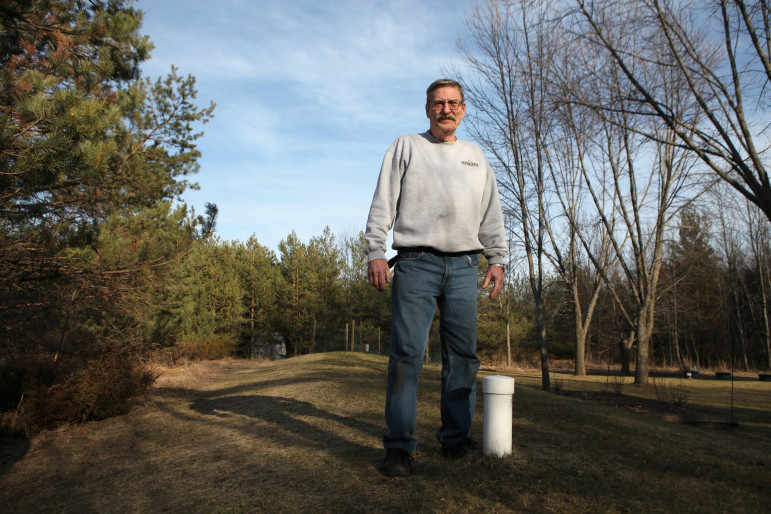
Alan Ashley stands on his mound septic system in Ephraim, Wisconsin, on March 12, 2016. In 1975, Ashley installed what he says was one of the first mound systems in Door County. The cost to replace the system for his four-bedroom house in 2007 was around $14,000. Photo by Coburn Dukehart of the Wisconsin Center for Investigative Journalism.
Officials in Shawano County, which opposed Walker’s proposal, pegged the cost of replacing a septic system at $6,000 to $7,000 for a traditional system and as much as $14,000 for a mound system that provides more protection in areas of fractured bedrock.
In the final budget, the Legislature partially restored the fund but slashed it to $1.6 million this year and $840,000 in 2016-17 — a move criticized by John Hausbeck, who oversees Dane County’s septic program.
“There are homeowners everywhere in the state that do not have the money to replace a septic system,” Hausbeck said. “So they limp along until they end up with water contamination.”
Article Continues - Pages: 1 2
Tainted Water
-
Fecal Microbes In 60% of Sampled Wells
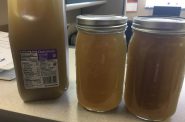 Jun 12th, 2017 by Coburn Dukehart
Jun 12th, 2017 by Coburn Dukehart
-
State’s Failures On Lead Pipes
 Jan 15th, 2017 by Cara Lombardo and Dee J. Hall
Jan 15th, 2017 by Cara Lombardo and Dee J. Hall
-
Lax Rules Expose Kids To Lead-Tainted Water
 Dec 19th, 2016 by Cara Lombardo and Dee J. Hall
Dec 19th, 2016 by Cara Lombardo and Dee J. Hall






















Rep Severson should have lost his physicians’ license for a comment like that. He SHOULD know better than most that getting sick from bad water could be deadly for those with compromised immune systems. It happened with the crypto crisis.